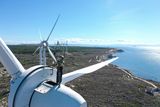State-backed firms hire record numbers but face a tough 2024
Housing shortage and protests by anti-immigrant groups raise fears
Leo Clancy, CEO of Enterprise Ireland
Irish firms are still hiring despite a global slowdown, but a housing shortage, tax debts and rising costs are taking some of the shine off the figures.
Following a third consecutive year of net job creation by State-backed domestic firms, Enterprise Minister Simon Coveney says Irish business is in “the strongest place that it’s ever been”.
But he admitted the increased costs of doing business, and the €1.7bn in Covid tax debts outstanding at the end of last year, needed to be watched closely.
The minister promised there would be “no cliff edge” for firms ahead of a May deadline to start repaying Revenue tax debts warehoused since the pandemic.
Mr Coveney also defended the level of inward migration but admitted that “everything isn’t rosy” when it comes to housing.
He insisted home-building this year would far outpace 2023, and the Government is getting a handle on the problem.
Leo Clancy, chief executive of Enterprise Ireland, pointed to growth risks posed by housing and labour shortages but said the biggest problem this year would be carbon reduction.
Another emerging risk, albeit one that has not yet been raised by multinationals, according to Mr Coveney, is an increase in violence by anti-immigrant groups in Dublin and around the country.
“I think you have always got to be gravely concerned when there is any sign that the social model we have had may be at risk, and I think it’s certainly been a wake-up call to Ireland,” Mr Clancy said.
“Anything that puts that at risk is to be feared, but I don’t believe that is a widespread reflection of Irish society.”
Mr Clancy said he reassures people who want to move to Ireland that “we are a broader society that has positivity towards migration”.
“Housing is an issue for our clients on an ongoing basis. Labour and skills tightness is one of the biggest factors affecting business and, in that context, the cost and availability of housing is always a factor for companies.”
Enterprise Ireland-backed firms created more than 5,000 net new jobs last year, new results published by the State agency show. Employment in Enterprise Ireland-supported companies increased to a record 225,495, with more jobs added than lost in all sectors, including technology.
Climate, sustainability and agri-tech jobs performed strongest, growing 7pc, while digital technology and fintech jobs grew at a more moderate 2pc.
The sharpest employment slowdown was seen in the engineering sector.
Eight out of nine Irish regions recorded net jobs growth, with the midlands having a 1pc dip.
Mr Clancy said the agency will put its focus in 2024 on companies that want to grow and scale, while still providing much-needed seed funding to Irish start-ups.
“We are re-examining how we might further support companies on that funding journey,” he said.
“Ideally we’d like to be out of the business of providing venture funding to anyone, and we’d like a vibrant ecosystem where an Enterprise Ireland potentially isn’t required. But I don’t think we’re there quite yet.”
Join the Irish Independent WhatsApp channel
Stay up to date with all the latest news















